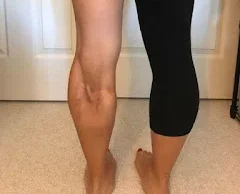When I was two years old, my family were refugees escaping from Vietnam on a boat traveling to America. I was asleep in my mother’s arms when my pants got caught in the motor, and the blades cut my leg. I was bleeding profusely in the middle of the ocean at night, and I almost died. It was a miracle that an American ship rescued us. As a baby unable to communicate my pain and suffering so much that it caused the splitting of my mind, it was too much pain for anyone to survive, and I needed a break; the only way was to retreat deep inside my mind so I split off a part of myself and created another separate part to help me bear the pain. This is a symptom of Dissociative Identity Disorder that I developed as a coping strategy and a response to the severe traumatic boat accident. It’s a disorder of the mind—an involuntary escape from my reality by a disconnection between thoughts, identity, consciousness, and memory. Throughout my childhood, I created some distinct personality parts that reacted to more trauma to help me avoid bad memories. As an adult, DID was fully developed as an adaptive defense in response to high stress or trauma characterized by memory loss and disconnection from myself. DID happen when my “inner child” or some other hidden part of myself operates independently, seizes control, and makes me act differently, not myself, and sometimes impairs my ability to function. I feel like some other person I refer to as a separate part inside me; I am describing a severe dissociative symptom because that internal “other parts” is an independent identity state. Whenever I believe that I am in extreme danger, dealing with an unbearable stressful situation, or am about to die, I become dissociated—that is, I activate altered states of consciousness that help me marshal the inner resources to cope with a situation that otherwise would have been overwhelming. For the past recent years, what I experienced was once a healthy adaptive defense on rare occasions is now an automatic response to everyday stress or any trigger of traumatic memories. I believe dissociative symptoms and the disorder must be taken seriously, but they can’t be dealt with realistically until we dispel the myth about them. Since dissociation has been so demonized and misrepresented to everyone, what people know about the disorder probably isn’t true. I’m living with old traumas and still learning how to help them.
Lena H. Nghiem
Hello! I’m Lena. Welcome to my writing website and higher calling—to carry the message of hope, healing, and recovery. I was a depressed, lost soul, and through the help of others, I found a new model of living that has profoundly changed my life for the better. I am indebted to those who guided me and were driven to pay it forward. The purpose of this space is to encourage others to look within, to help those suffering from loneliness, restlessness, and discontent, and to aid those struggling with anxiety, anger, fear, depression, addiction, trauma, mental illness, and suicidal ideation. I believe that when we honestly look at our behaviors, thoughts, feelings, and belief systems—and work with them—we can alleviate the causes of our suffering and bring joy and happiness.
LET'S CONNECT
I Survived.
